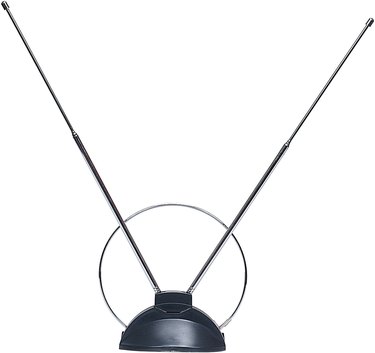
Since February 2009, all TVs in the United States receive a digital signal after analog transmissions officially stopped for good. However, if you don't have cable or satellite TV, then your TV antenna still receives the digital signal itself. Any tall structure, including trees, can interfere with this signal. So, if your garden contains lots of pines, elms or similar tall trees, you may experience TV interference.
TV Antenna
Video of the Day
TV antennas come in two main forms -- internal and external. An internal antenna is usually attached to the top or sits alongside the TV. To pick up digital signals, the antenna must detect VHF and UHF channels, according to the Federal Communications Commission. An external antenna usually sits on top of your house roof. It's larger than an internal antenna and the high position gives it a clearer signal. Internal antennas need a much stronger signal to work properly than external antennas.
Video of the Day
Interference
Large trees can interfere with TV antenna reception. Indoor antennas in particular might struggle if near tall, bushy trees, according to the government's DTV website. Tall structures such as trees interfere with the signal by obstructing the signal waves or reflecting them off their foliage. Trees with wet leaves in rainy condition can reflect even more of the signal. With digital TV, this causes the picture to freeze, turn jerky or disappear altogether.
Solutions
When positioning your external antenna, place it as far away from large trees as possible. For example, if one side of your garden has a row of Leyland Cypress trees, try putting your antenna on the opposite side of the house. With indoor antennas, try putting it higher on a bookshelf or similar. You may need an extension cord to run it up to an upstairs room. In both cases, you can buy signal boosters. These are devices that enhance an antenna's ability to receive TV signals.
Considerations
A tree's ability to interfere with a TV signal may be seasonal. For example, a large deciduous tree sheds its leaves in fall. This exposes the bare branches and takes away the bushy foliage of the tree, providing much less obstruction for TV signals. You may notice your signal improves in fall and winter. If so, it's likely because you have some large deciduous trees nearby. Investing in a signal booster for the summer and spring months may help improve your picture quality for the rest of the year.